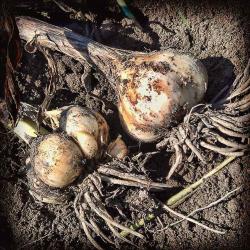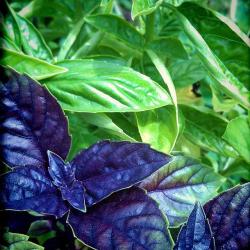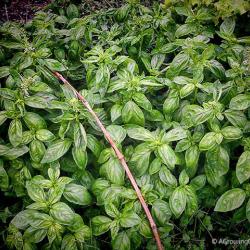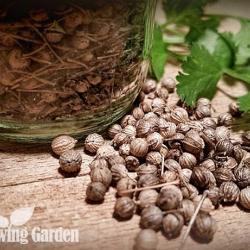
When I first started our vegetable and herb gardens here years ago, I bought a little of everything. Seriously, I went bonkers and bought waaaaay too much. I just didn't have the knowledge, experience, or the time to plant everything, or to keep everything in tip top shape. The weeds got out of control. Bugs and pests invaded. And quite a few plants died.
**SIGH**
I certainly learned a lot that year but I also came across some new and interesting things to grow and cook with. One of the things I discovered in my plant and seed buying zest was garlic chives and, in the words of Martha Stewart, it was a good thing.
Not knowing that there was a real difference between the two, I bought both regular chives and garlic chives. I pretty much thought (and still think!) that anything with 'garlic' in the name is worth growing. After all, garlic makes everything better AND it keeps the vampires away ... so, what's not to like?
Garlic Chives (Allium tuberosum)
Garlic chives are similar to traditional chives, but they certainly aren't just a more garlic-y version as I had originally thought. Most people know regular chives. They are what you often find in the grocery store -- they have a tubular stem and, when left to flower in your garden, produce pink ball-like flowers.
On the other hand, garlic chives have flat stems and produce white flowers. The flavor of garlic chives is less onion-y and more garlic-y (if only slightly) than regular chives. Also called Chinese chives, garlic chives are used a lot in Asian cooking and both the stems and the flowers are edible.
Growing garlic chives is a breeze. They are perennials in zones 4 through 8 and can be grown easily from seed. Garlic chives can get a bit zealous (to put it nicely) and grow in clumps which need to be divided every few years. They do re-seed freely, so if they become invasive and start to take over everything, be sure to remove any flowers that form before they go to seed.
If you don't already have garlic chives in your herb garden, you should try them... they are easy to grow and can add some zip, zest and zing (not necessarily in that order) to your cooking!












Join the Conversation!